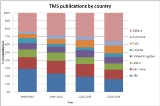
Transcranial magnetic stimulation
Overview
Transcranial magnetic stimulation (TMS) is a noninvasive method to cause depolarization
or hyperpolarization
in the neuron
s of the brain
. TMS uses electromagnetic induction
to induce weak electric current
s using a rapidly changing magnetic field
; this can cause activity in specific or general parts of the brain with minimal discomfort, allowing the functioning and interconnections of the brain to be studied. A variant of TMS, repetitive transcranial magnetic stimulation (rTMS), has been tested as a treatment tool for various neurological
and psychiatric disorders including migraine
s, stroke
s, Parkinson's disease
, dystonia
, tinnitus
, depression and auditory hallucination
s.
The principle of inductive brain stimulation with eddy current
s has been noted since the 20th century.
Depolarization
In biology, depolarization is a change in a cell's membrane potential, making it more positive, or less negative. In neurons and some other cells, a large enough depolarization may result in an action potential...
or hyperpolarization
Hyperpolarization
Hyperpolarization has several meanings:* Hyperpolarization occurs when the strength of the electric field across the width of a cell membrane increases...
in the neuron
Neuron
A neuron is an electrically excitable cell that processes and transmits information by electrical and chemical signaling. Chemical signaling occurs via synapses, specialized connections with other cells. Neurons connect to each other to form networks. Neurons are the core components of the nervous...
s of the brain
Brain
The brain is the center of the nervous system in all vertebrate and most invertebrate animals—only a few primitive invertebrates such as sponges, jellyfish, sea squirts and starfishes do not have one. It is located in the head, usually close to primary sensory apparatus such as vision, hearing,...
. TMS uses electromagnetic induction
Electromagnetic induction
Electromagnetic induction is the production of an electric current across a conductor moving through a magnetic field. It underlies the operation of generators, transformers, induction motors, electric motors, synchronous motors, and solenoids....
to induce weak electric current
Electric current
Electric current is a flow of electric charge through a medium.This charge is typically carried by moving electrons in a conductor such as wire...
s using a rapidly changing magnetic field
Magnetic field
A magnetic field is a mathematical description of the magnetic influence of electric currents and magnetic materials. The magnetic field at any given point is specified by both a direction and a magnitude ; as such it is a vector field.Technically, a magnetic field is a pseudo vector;...
; this can cause activity in specific or general parts of the brain with minimal discomfort, allowing the functioning and interconnections of the brain to be studied. A variant of TMS, repetitive transcranial magnetic stimulation (rTMS), has been tested as a treatment tool for various neurological
Neurological disorder
A neurological disorder is a disorder of the body's nervous system. Structural, biochemical or electrical abnormalities in the brain, spinal cord, or in the nerves leading to or from them, can result in symptoms such as paralysis, muscle weakness, poor coordination, loss of sensation, seizures,...
and psychiatric disorders including migraine
Migraine
Migraine is a chronic neurological disorder characterized by moderate to severe headaches, and nausea...
s, stroke
Stroke
A stroke, previously known medically as a cerebrovascular accident , is the rapidly developing loss of brain function due to disturbance in the blood supply to the brain. This can be due to ischemia caused by blockage , or a hemorrhage...
s, Parkinson's disease
Parkinson's disease
Parkinson's disease is a degenerative disorder of the central nervous system...
, dystonia
Dystonia
Dystonia is a neurological movement disorder, in which sustained muscle contractions cause twisting and repetitive movements or abnormal postures. The disorder may be hereditary or caused by other factors such as birth-related or other physical trauma, infection, poisoning or reaction to...
, tinnitus
Tinnitus
Tinnitus |ringing]]") is the perception of sound within the human ear in the absence of corresponding external sound.Tinnitus is not a disease, but a symptom that can result from a wide range of underlying causes: abnormally loud sounds in the ear canal for even the briefest period , ear...
, depression and auditory hallucination
Auditory hallucination
An auditory hallucination, or paracusia, is a form of hallucination that involves perceiving sounds without auditory stimulus. A common form involves hearing one or more talking voices...
s.
The principle of inductive brain stimulation with eddy current
Eddy current
Eddy currents are electric currents induced in conductors when a conductor is exposed to a changing magnetic field; due to relative motion of the field source and conductor or due to variations of the field with time. This can cause a circulating flow of electrons, or current, within the body of...
s has been noted since the 20th century.
Unanswered Questions

